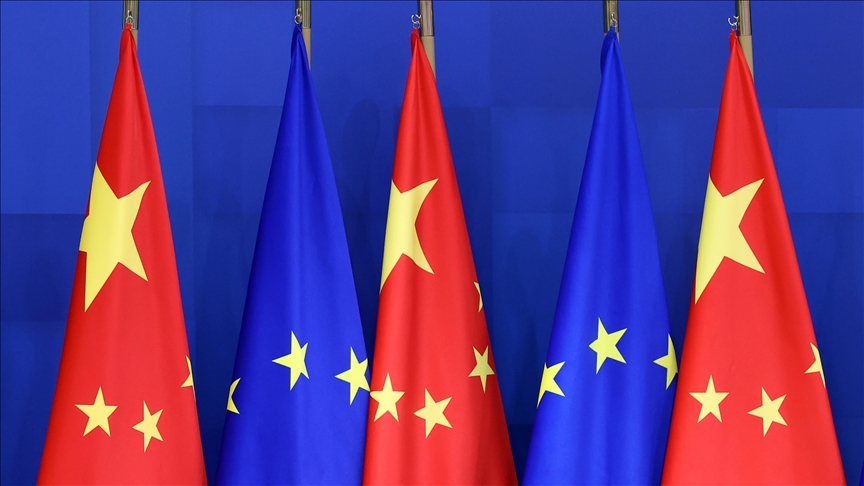

By Anadolu Agency
The author is a program director at the Central European Institute of Asian Studies (CEIAS). He is also an assistant professor and senior researcher at Palacky University Olomouc.
ISTANBUL
Talking about the European Union (EU) as being ‘divided’ or ‘fragmented’ has become a bit of a cottage industry – and that applies particularly to its relations with China. “Europe is disastrously split on China”, argued a title of a recent piece in Foreign Policy. Even when things seem to be getting supposedly better (i.e., towards more unified approach), they are presented as an anomaly: “The EU’s divided approach on China might be coming to an end”, argued similarly recent piece in CNBC.
The common ground
The perspective that the EU is extraordinarily split on China is not accurate and it shreds our understanding of EU-China relations. Obviously, finding a common ground between now 27 members who are sovereign countries with own national interests is difficult. As a result, the EU foreign policy has been famously quite unambitious and unassertive – that applies to the relations with China as well as to many other areas. However, if anything, it can be seen as surprising how close actually most of the EU countries are to each other when it comes to China.
Public opinion surveys have, for instance, found that public perspective on China and preferred foreign policy are in most of the EU countries similar. There is no country in the EU who would be decisively positive about China – instead, negative views are dominant across the continent. At the same time, the most preferred foreign policy towards China is to cooperate with it on the global issues, such as climate change or pandemics. The publics across the EU do not seem overly enthusiastic about new economic opportunities coming from China, but they do recognize China’s existing economic role.
Different perspectives of member states
Nonetheless, the differences do appear when reviewing individual actions and announcements by various EU members. Specifically, Hungary is the country most often considered to be an obstacle to a common EU position. It commonly serves as a lone EU voice supporting China’s positions rhetorically (such as most recently when it backed China’s position on the Russia-Ukraine war), while also vetoing official critical statements by the EU on China (such as criticizing it for treatment of Hong Kong). In the past, similar vetoes of the EU plans for the critical statements were allegedly taken also by Greece and even Croatia.
This may lead some to fall back on the accusation that the Central and Eastern European (CEE) members are too cosy with China, perhaps as a result of China’s economic activities. In reality, such accusation would be false on multiple grounds. First, the economic relations of the CEE countries with China are actually far less developed than those between China and the Western European countries, especially Germany. In other words, China lacks economic leverage over the CEE countries to push or punish them even if it wanted to.
Second, Hungary is an exception rather than a representative case of a CEE country when it comes to relations with China and perhaps in many other issues, too. For instance, other CEE countries, such as the Czech Republic, Lithuania, Slovakia and Poland have been recently pushing the limits of developing relations with Taiwan, withstanding China’s pressure to do so.
Interestingly, it was the Western Europe who have recently been more willing to engage China, such as the EU leaders Ursula von der Leyen and Charles Michel. We can also include German Chancellor Olaf Scholz and Spanish President Pedro Sánchez to this list, who travelled officially to China at the end of 2022 and beginning of 2023. Even more notable and telling was the recent French President Emmanuel Macron’s trip to China and the criticism he received for his statements made during this trip, which to many in the CEE countries appeared in similar fashion as the previous position vis-à-vis Russia, labelled as weak.
The middle position
The public discussions about how to approach China often morph into disputes and finger-pointing of who is to be blamed for supposedly undermining the common EU position. Yet the EU includes 27 sovereign countries, and it is only natural that they don’t have identical position on various issues, including on China. There are some countries who have backed China on sensitive issues such as Hungary, but there are also those, who are willing to go an extra mile on the same such as Lithuania or the Czech Republic.
Still, most of the EU countries and the EU institutions – as well as the public across the continent – are largely aligned around the middle position, which has been since 2019 described by tripartite “partner-competitor-rival”. Accordingly, the EU sees a need to comprehensively engage China on global issues, it considers economic exchanges with China competitive but also irreplaceable, while at the same time want to take a principled position on the issues of values.
We use cookies on our website to give you a better experience, improve performance, and for analytics. For more information, please see our Cookie Policy By clicking “Accept” you agree to our use of cookies.
Read More